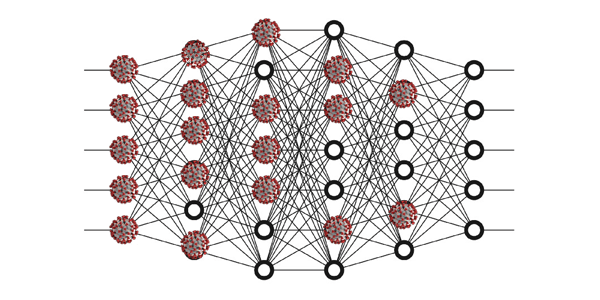
Patrick Boyle
UW Bioengineering Assistant Professor Patrick Boyle and his collaborators in UW cardiology and epidemiology are developing a way to use artificial intelligence to help frontline health care workers predict which COVID-19 patients are at highest risk for heart complications from the illness. The team recently secured $20,000 in rapid response funding for the project from UW’s Population Health Initiative.
Doctors around the world are seeing infected patients with new heart injuries such as heart attack, heart muscle inflammation caused by the virus and potentially fatal heart arrhythmias. Being able to quickly and safely screen patients to determine who is at greatest risk for the life-threatening conditions could make it easier for doctors and nurses to intervene earlier and reduce their own exposure to the virus. As head of UW’s Cardiac Systems Simulation Lab, Dr. Boyle is well-positioned to apply his computational expertise in predicting heart rhythm disorders and sudden cardiac death.
A type of artificial intelligence, deep neural networks, can be trained to pinpoint subtle differences and patterns among electrocardiograms, or EKGs, tests that measure the electrical activity of the heart. Boyle and his team hope to rapidly develop and deploy an online tool that will accept uploaded EKGs acquired at hospital intake, The researchers have circulated a clinical data collection protocol within the UW Health Care System, which they hope will facilitate retrospective analysis of EKG data from all since the onset of the pandemic. To maximize the strength of the deep learning tool, the team is now building a network of collaborators across Europe to gain access to EKG data and outcomes from hard-hit locations there.
Dr. Boyle is a member of the UW Institute for Stem Cell and Regenerative Medicine and the Center for Cardiovascular Biology. Key UW collaborators on the team include Dr. Arun Sridhar, Dr. Neal Chatterjee, Dr. Jeanne Poole (Cardiology), and Dr. Alison Fohner (Epidemiology). A trainee in Dr. Boyle’s lab (Amber Zih-Hua Chen, M.S. student in Biomedical Electronics) is also a major contributor to the work.
Read about more coronavirus-related projects in the UW Bioengineering department.


